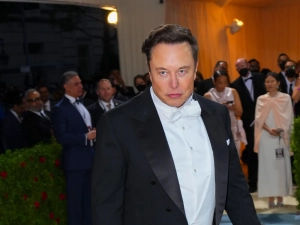
Elon Musk has made multiple headlines in the last few weeks, none of which had anything to do with electric cars or flying to Mars. First, out of the blue, he posted a poll on Twitter for his solution to the war in Ukraine, which basically involved Ukraine ceding Crimea to Russia, the United Nations overseeing a vote for the rest of terrain Russia has taken, and Ukraine formally promising to remain “neutral” for eternity. In other words, Elon’s solution is for Ukraine to capitulate to Putin, thereby ending the war. The only proof he offers that this isn’t lopsided against Ukraine is some strange reference to “Khrushchev’s mistake”, as if he has done some weighty thinking on the matter and understands the history of the region better than the average Twitter user.
When the tweet originally went up, I was going to write about the intricacies of how misguided it was – such as him conveniently missing the history of the United Nations 1994 Budapest Memorandum whereby the Russian Federation agreed to the sovereignty of Ukraine, to include the current borders, in exchange for Ukraine giving up its old USSR nuclear weapons. Nowhere was “Khrushchev’s mistake” mentioned in the document. It’s ironic that Elon’s stated purpose for the tweet is to prevent nuclear war with Russia, when the fact is that if Ukraine hadn’t believed Russia’s sincerity in 1994 and kept its nuclear weapons as a deterrent against the Russian bear, none of this would be happening. Before I could even get my thoughts together, Elon made news again, this time against Taiwan.
In an interview with the Financial Times, he opined that Taiwan should just join China as an autonomous region, much like Hong Kong. Once again, I was flabbergasted. If Hong Kong has shown Taiwan anything, it’s precisely that China does not honor any agreements made about autonomous regions, or its “One Country, Two Systems” promises, as Hong Kong itself has lost all ability to manage its affairs, with democracy now a sham and dissidents routinely arrested and jailed over draconian “state security” laws.
What was Elon thinking? Did he believe that because he is the richest man in the world, his opinion should matter in areas that are completely outside his expertise? Does putting a rocket into orbit transfer to expertise in military affairs and foreign policy?
When I was in graduate school I took a class in philosophy, and part of the instruction was on common logical fallacies. Elon is the personification of one: The Appeal to Authority. This is when someone who’s an authority figure or perceived expert in one area is touted during an argument completely outside his scope of duties or expertise. A good example is the old pain reliever commercial where an actor says, “I’m not a doctor, but I play one on TV, and I know painkiller X is the best…” Because the man played a doctor on television, I’m supposed to believe that he knows what’s best about my health.
Elon is basically doing the same thing here: “I’m not a national security expert, but I play one on Twitter”. Because he’s the creator of Tesla and Space X, which is admirable and has made him the richest man on earth, we are to assume that such accomplishments transfer to all other endeavors. Unfortunately, the world doesn’t work that way. His incredible work in one industry – and SpaceX is pretty incredible – does not make him an authority in any subject matter on which he chooses to opine.
This is not the first time Elon Musk has applied the fallacy. In 2018, twelve boys and their soccer coach were trapped in a cave in Thailand, with monsoon floods preventing them from exiting. There was an incredible world-wide response, with experts in cave diving arriving to help. Elon Musk decided he would do the same, creating a submarine that he said would rescue the boys. He personally traveled to Thailand to present it. The world swooned that SpaceX was there to save the day. When presented with the sub, the actual cave diving experts – who had been back and forth under the water to the boys – said it wouldn’t work. Elon’s response was to call one of them a pedophile on twitter. What was his crime for the slur? He used his actual expertise to tell Musk his ability to build an electric car didn’t transfer to a cave rescue. That “pedo”, by the way, ended up helping to save all thirteen of the Thais – without the submarine.
As I studied the problem set a little deeper, trying to ascertain whether I was being too harsh on Musk – maybe he did have some knowledge in foreign affairs of which I was unaware – I began to believe that both statements were, in fact, within his wheelhouse. Not in National Security, but within his true expertise: making money.
At the start of the war in Ukraine, Elon Musk’s SpaceX donated a satellite capability known as Starlink to the Ukrainian effort, giving the country access to satellite internet that Putin couldn’t destroy or interrupt. It proved to be vital to the war effort, and he was profusely praised both by the government of Ukraine and other world leaders. The problem is that all of the terminals cost money to use and Starlink began losing millions and millions of dollars each month keeping them in operation. Weeks before he posted his ludicrous peace-plan tweet, SpaceX had told the Pentagon that it could no longer fund the Starlink terminals, and that the DOD needed to start picking up the tab. The Pentagon balked, leaving Elon with a choice: Stop supporting the links, which would make him look like a master villain after all the praise he’d received, or continue losing money until the war was over – which could be years. In order to stop the service, he needed a precursor reason. In short, he needed Ukraine to do something that would give him an excuse, making them the bad guy. So, he posted his “peace plan”, which he knew would cause everyone to howl – especially Ukraine. This is, in fact, what occurred, with the Ukrainian ambassador to Germany telling him to “f*&^ off” on Twitter. This isn’t just me grasping at straws. Elon Musk has pretty much admitted it. Recently, he has begun shutting down the Starlink systems, causing havoc on the battlefield. When one reporter made the connection between the harassment he’d received over his peace plan and him cutting service, he responded, “We’re just following his recommendation”, complete with a shoulder shrug emoji:
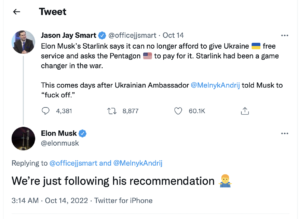
In effect, it’s not SpaceX being Dr. Evil, it’s those ungrateful Ukrainians treating his generosity with vulgar slurs. In the end, the entire “peace plan” tweet may have been nothing more than him creating drama to provide him an excuse to stop losing money – and squeeze the Department of Defense to pick up the tab so he starts making money off the war in Ukraine.
The China/Taiwan statement was a real head scratcher, though. Why, in an interview with the Financial Times, would he even broach the issue? Well, it turns out that Tesla doesn’t export cars into China – it builds them right there. Tesla has a factory in Shanghai where every car sold in China originates, and while the China share of Tesla is about 50% of the US share, it’s growing in leaps and bounds, with September of this year setting a record for the number of cars sold. China, as the world’s most populous country, is the biggest market for Tesla – if Elon’s allowed to continue selling there. The Shanghai factory is the first and only such factory in China that was not required to be a joint venture, meaning that Tesla owns it outright, but only at the invitation of the Chinese Communist Party. Any study of industry in China will show that the Chinese are extremely sensitive to perceived slights against them, with far reaching repercussions to profit – as US institutions from the NBA to Hollywood have learned – and Elon Musk is well aware of that fact. Either follow the guidance of the CCP, or get out of its country. It’s more profitable to get on the CCP’s good side, and what better way to do that than to side with the CCP on the issue of Taiwan? And that’s exactly what’s occurred, as multiple Chinese officials have praised his statement, including the Chinese ambassador to the United States, who tweeted, “I would like to thank [Elon Musk]for his call for peace across the Taiwan Strait and his idea about establishing a special administrative zone for Taiwan…” So, I don’t think Elon is actually offering a peace plan for the “reunification” of China. He’s just trying to sell Teslas for his own personal goals at the expense of the thriving democracy of Taiwan.
In the end, I can’t get into the mind of Elon Musk, and don’t know if he’s really trying to play statesman or simply acting as a rapacious profit-driven CEO—it might be a little of both. But I definitely think the question should be asked – especially since all of his pronouncements have major repercussions on the world stage, causing issues well beyond the expertise of the man making the statement. Attempting to manipulate the international order – with all the faux authority of the richest man on earth – simply to make a profit is not in the best interests of the United States or any other western democracy. By extension, it’s also not in the best interest of you, the reader.
Update 15 Oct.
I literally hadn’t even posted this yet when Elon Musk backed down from not funding the Starlink system. On twitter, of course. I guess he did the math and found out that looking like Dr. Evil in Ukraine would be worse for his brand than taking a loss on Starlink. He snarked about losing money and the US paying for other things besides his systems, but backed down. Always about the bottom line.




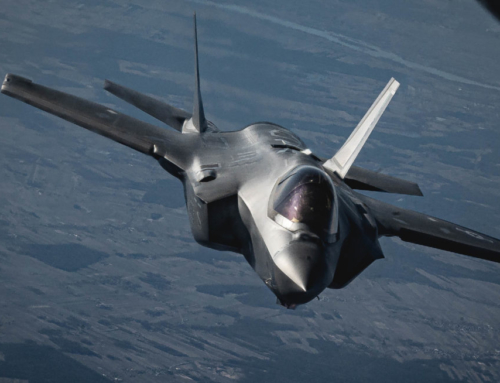
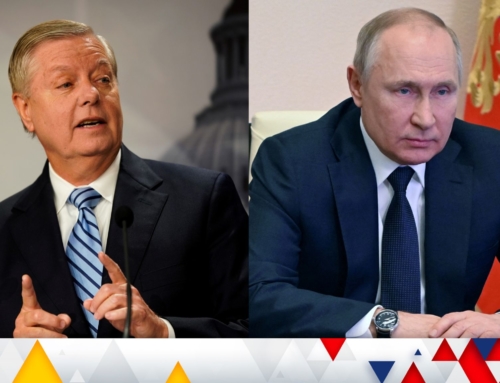

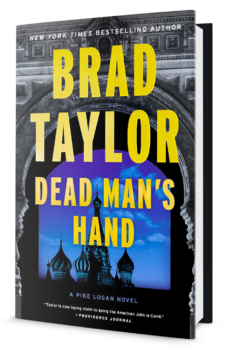
Great analysis
Voice of reason
Thank you for writing this blog, which gives such solid ground to what many of us feel about Musk’s actions. In light of these, and also more recent actions with Twitter itself, I have felt that Elon personifies the biblical saying: “For how is a man benefited if he should gain the whole world and he should lose his soul?”